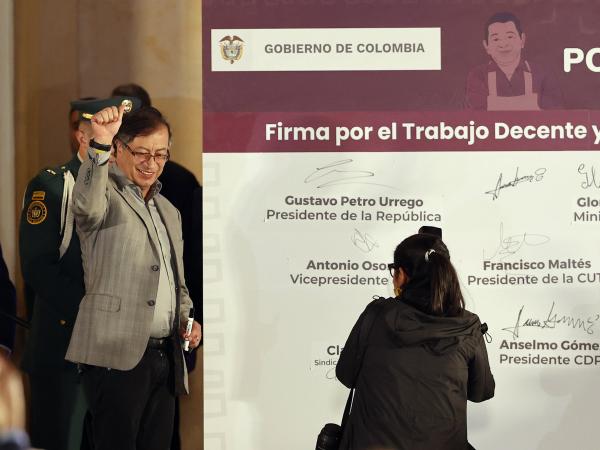In the coming weeks, the Congress of the Republic will debate the Government’s proposal to reform the Colombian labor system. This Thursday night, the labor reform project, made up of 76 articles, was filed.
(How much would costs rise for a company with the labor reform).
The project was the result of five months of work by the subcommittee appointed by the Ministry of Labor, and meetings during the last week in the Coordination Commission for Salary and Labor Policies with the participation of unions and trade unions.
Despite these spaces, the articles, which did not undergo many changes compared to the draft that was discussed in recent days at the negotiation table, still raises doubts both among the unions and in the academy and experts.
The reform seeks to modify the Labour Codegrant equal opportunities for workers, the protection of the individual rights of workers, and the guarantee of collective labor rights, referring to union guarantees.
Among the latest adjustments made by the Ministry of Labor against the preliminary texts is, for example, that fixed-term contracts may be for up to two years.
(Labor reform text did not include some suggestions from employers).
One of the proposals that had generated the most controversy was the figure of reinforced labor stability, which although it was included, left out the fathers and mothers of families who have no other type of income.
This measure, which was consigned in article 7 of the text, establishes that certain population groups, such as pre-pensioners, pregnant women or people with disability.
But in addition, those workers were included there “protected by union immunity”and also those “protected by the health law”.
Another change that was included in the final text has to do with compensation for unfair dismissals. The reform indicates that, in indefinite-term contracts, an indemnity of 45 days of salary will be paid when the worker has a service period of no more than one year.
When the permanence in employment has been of more than one year of continuous service, “You will be paid an additional 45 days of salary over the basic 45 of the previous point, for each of the years of service subsequent to the first, and proportionally by fraction.”
In the draft, an initial payment of only 30 days was intended in the latter case.
Among the biggest changes that the reform brings with it is the modification of the working day in Colombia. This will be 8 hours of work per day and a maximum of 42 hours per week, spread over 5 or 6 days.
In addition, it is determined the daytime work shift will be from 6:00 am to 6:00 pm, and the night shift from 6:00 pm and 6:00 am the following day.
(These are the changes of the labor reform filed in Congress).
The final text also establishes exceptions for certain activities, for which “The employer must keep a daily record of the supplementary work of each worker in which the name, activity carried out and number of hours worked are specified, with the precision of whether they are day or night.”
Another key element of the project is the regulation of work on delivery technology platforms. The text not only defines which activities are classified as such, but also determines, in terms of labor relations, that the platforms must bind these workers to an employment contract, and that they must also affiliate their workers to social security.
Faced with this point, some platforms, such as Rappi, have shown their concern. In recent days, Matias Laks, CEO of Rappi Colombia, said that the reform could affect the income of those who work in this model.
The vision of the unions
Despite the discussions in recent days at the Roundtable, for some unions, the project presents risks for certain productive activities. From Fenalco they spoke about how the labor reform would increase unemployment, because according to the merchants union, due to an increase in the costs for hiring personnel. According to Fenalco, an agreement was only reached on a few items.
Likewise, from Andi, its president Bruce Mac Master, said that “It is worrying that some measures contained in the reform will generate more unemployment,” and that SMEs could be affected by the regulation for outsourcing.
LAURA LUCIA BECERRA ELEJALDE








